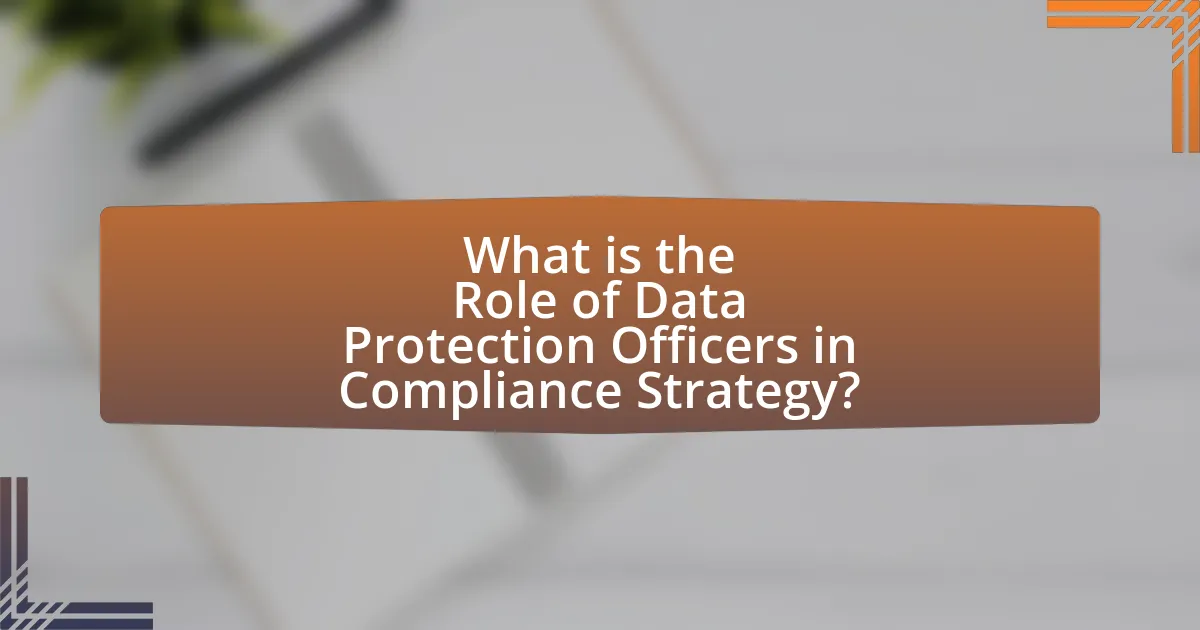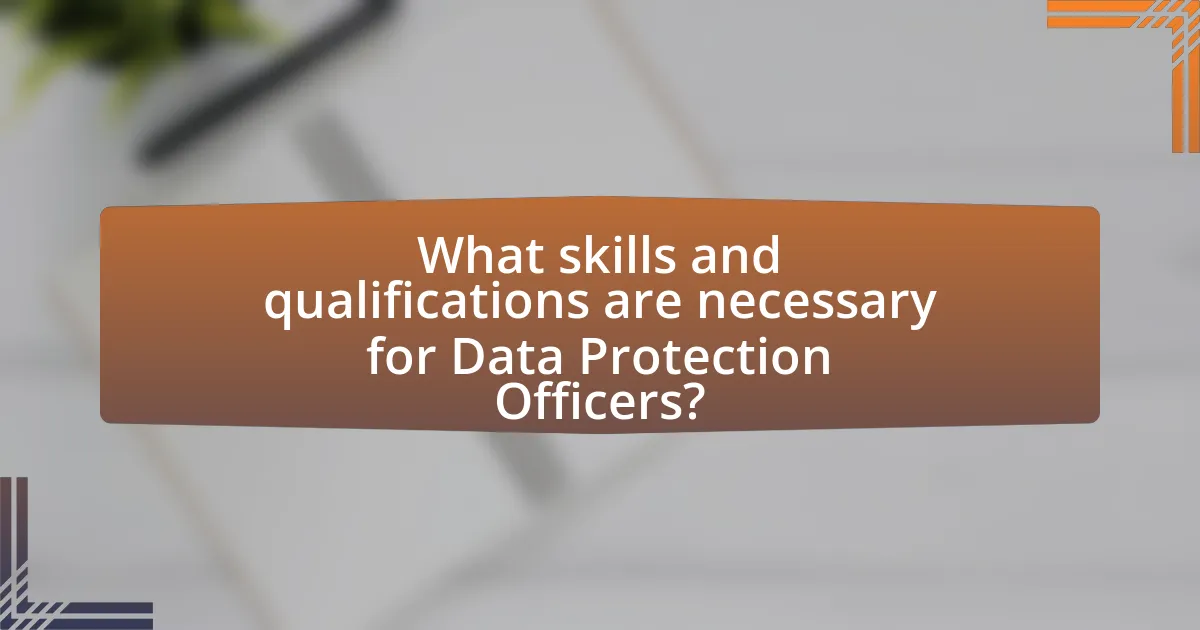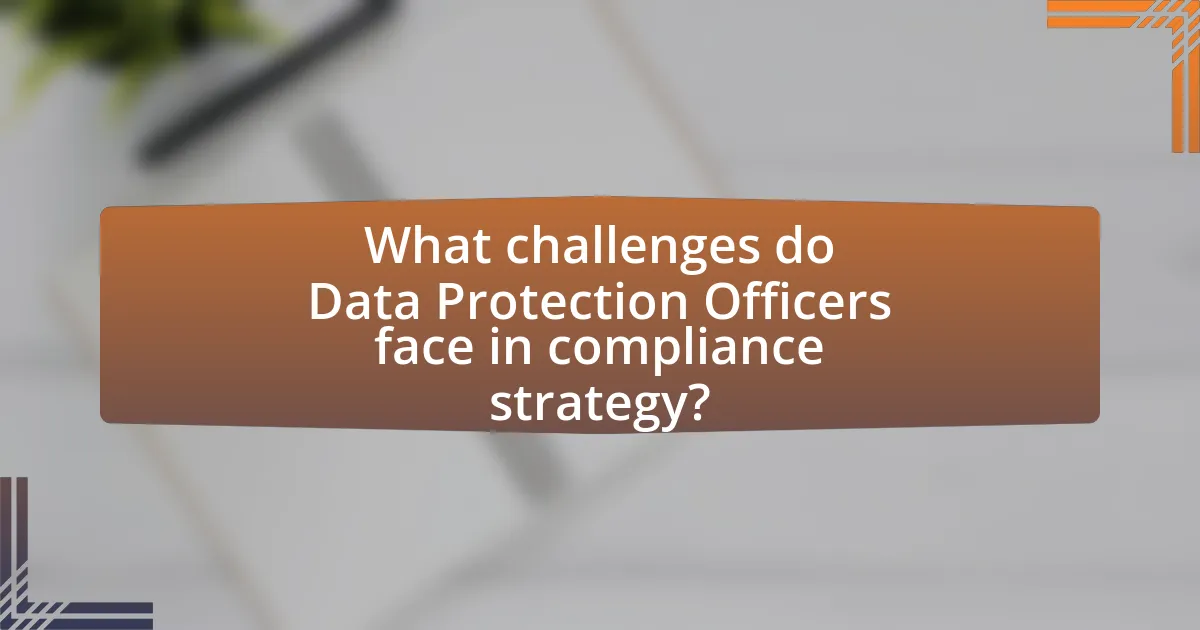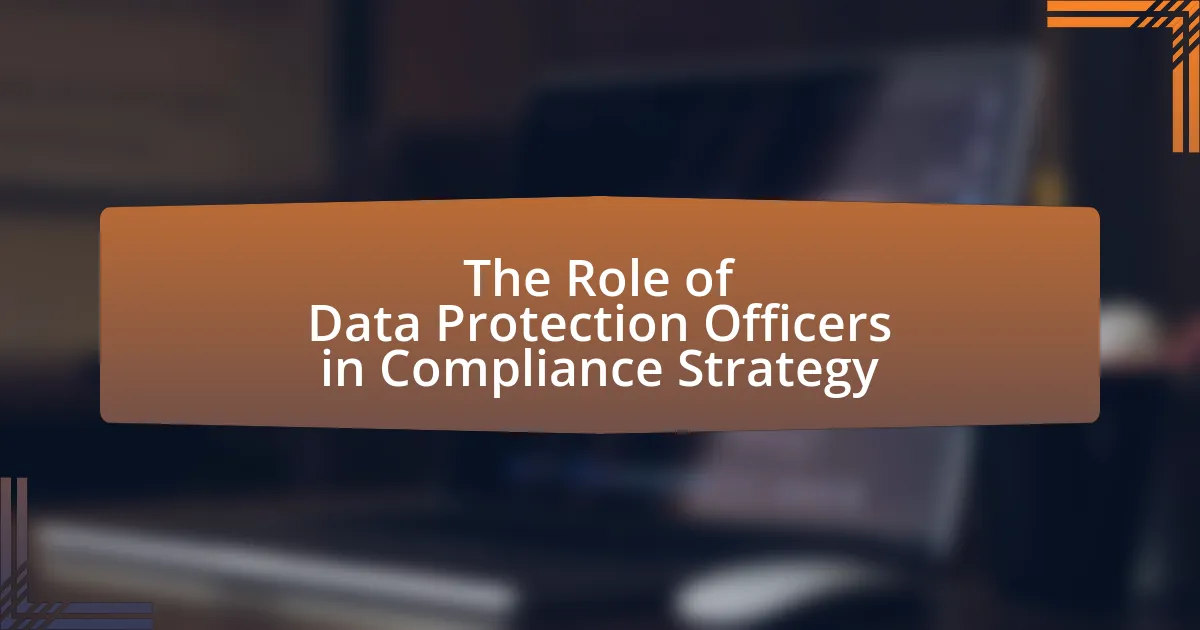Data Protection Officers (DPOs) are essential in ensuring organizational compliance with data protection laws and regulations, particularly the General Data Protection Regulation (GDPR). They are responsible for monitoring compliance, advising on data protection obligations, and serving as a liaison between data subjects and regulatory authorities. Key responsibilities include conducting audits, implementing data protection policies, and providing training to staff. The article explores the critical role of DPOs in compliance strategy, the skills and qualifications required, the challenges they face, and best practices for effective data governance. Additionally, it highlights the importance of organizational support and culture in enhancing the effectiveness of DPOs.

What is the Role of Data Protection Officers in Compliance Strategy?
Data Protection Officers (DPOs) play a crucial role in compliance strategy by ensuring that organizations adhere to data protection laws and regulations. DPOs are responsible for monitoring compliance, advising on data protection obligations, and serving as a point of contact for data subjects and regulatory authorities. Their expertise helps organizations mitigate risks associated with data processing activities, thereby enhancing overall compliance. For instance, under the General Data Protection Regulation (GDPR), appointing a DPO is mandatory for certain organizations, emphasizing their importance in maintaining legal compliance and protecting personal data.
How do Data Protection Officers contribute to organizational compliance?
Data Protection Officers (DPOs) contribute to organizational compliance by ensuring adherence to data protection laws and regulations. They implement policies and procedures that align with legal requirements, such as the General Data Protection Regulation (GDPR), which mandates specific data handling practices. DPOs conduct regular audits and risk assessments to identify compliance gaps, providing organizations with actionable insights to mitigate risks. Furthermore, they serve as a point of contact for data subjects and regulatory authorities, facilitating communication and transparency. Their expertise in data protection law and best practices is essential for organizations to avoid legal penalties and maintain consumer trust.
What are the key responsibilities of Data Protection Officers?
Data Protection Officers (DPOs) are responsible for ensuring compliance with data protection laws and regulations. Their key responsibilities include overseeing data protection strategies, conducting data protection impact assessments, and serving as a point of contact for data subjects and regulatory authorities. DPOs also provide training and guidance to staff on data protection matters, monitor compliance with data protection policies, and maintain records of processing activities. These responsibilities are critical for organizations to mitigate risks associated with data breaches and ensure the protection of personal data as mandated by regulations such as the General Data Protection Regulation (GDPR).
How do Data Protection Officers ensure adherence to data protection laws?
Data Protection Officers (DPOs) ensure adherence to data protection laws by implementing compliance frameworks, conducting regular audits, and providing training to staff. They establish policies and procedures that align with regulations such as the General Data Protection Regulation (GDPR), ensuring that data handling practices meet legal standards. DPOs also monitor data processing activities, assess risks, and advise organizations on data protection impact assessments. Their role includes maintaining documentation and facilitating communication with regulatory authorities, which reinforces accountability and transparency in data management practices.
Why are Data Protection Officers essential for compliance strategy?
Data Protection Officers (DPOs) are essential for compliance strategy because they ensure that organizations adhere to data protection laws and regulations, such as the General Data Protection Regulation (GDPR). DPOs are responsible for monitoring compliance, providing guidance on data protection obligations, and serving as a point of contact for data subjects and regulatory authorities. Their expertise helps organizations mitigate risks associated with data breaches and non-compliance, which can result in significant financial penalties; for instance, GDPR violations can lead to fines of up to 4% of annual global turnover or €20 million, whichever is higher. By implementing effective data protection practices, DPOs play a critical role in fostering a culture of compliance within organizations.
What risks do organizations face without a Data Protection Officer?
Organizations face significant risks without a Data Protection Officer (DPO), including increased vulnerability to data breaches and non-compliance with data protection regulations. The absence of a DPO can lead to inadequate oversight of data handling practices, resulting in potential legal penalties; for instance, the General Data Protection Regulation (GDPR) imposes fines of up to 4% of annual global turnover for non-compliance. Additionally, organizations may suffer reputational damage and loss of customer trust, as consumers are increasingly concerned about how their data is managed. Without a DPO, organizations may also lack a clear strategy for data protection, leading to inefficient responses to data incidents and a higher likelihood of operational disruptions.
How do Data Protection Officers enhance trust and transparency?
Data Protection Officers (DPOs) enhance trust and transparency by ensuring compliance with data protection regulations and fostering a culture of accountability within organizations. DPOs implement policies and procedures that safeguard personal data, which builds consumer confidence in how their information is handled. For instance, the General Data Protection Regulation (GDPR) mandates the appointment of a DPO for certain organizations, emphasizing the importance of having a dedicated professional to oversee data protection practices. This role includes conducting regular audits, providing training, and serving as a point of contact for data subjects, which collectively contribute to a transparent data handling process. By actively engaging with stakeholders and addressing concerns regarding data privacy, DPOs reinforce the organization’s commitment to ethical data management, thereby enhancing overall trust.

What skills and qualifications are necessary for Data Protection Officers?
Data Protection Officers (DPOs) require a combination of legal knowledge, technical expertise, and strong communication skills. Specifically, they should possess a thorough understanding of data protection laws, such as the General Data Protection Regulation (GDPR), and have experience in compliance and risk management. Additionally, DPOs should be proficient in data security practices and technologies, enabling them to assess and mitigate risks effectively. Strong analytical skills are essential for interpreting complex regulations and data, while excellent communication abilities are necessary for training staff and liaising with regulatory authorities. These qualifications ensure that DPOs can effectively oversee data protection strategies and maintain compliance within organizations.
What educational background is typically required for Data Protection Officers?
Data Protection Officers typically require a background in law, information technology, or data protection. This educational foundation is essential as it equips them with the necessary knowledge of legal frameworks, data management practices, and compliance requirements. Many Data Protection Officers hold degrees in fields such as law, computer science, or information systems, which provide a solid understanding of both the legal and technical aspects of data protection. Additionally, certifications in data protection, such as Certified Information Privacy Professional (CIPP), further validate their expertise in the field.
Which certifications are beneficial for Data Protection Officers?
Certifications beneficial for Data Protection Officers include Certified Information Privacy Professional (CIPP), Certified Information Privacy Manager (CIPM), and Certified Information Systems Security Professional (CISSP). The CIPP certification focuses on privacy laws and regulations, providing essential knowledge for compliance. The CIPM certification emphasizes privacy program management, equipping Data Protection Officers with skills to implement and manage privacy programs effectively. The CISSP certification covers a broad range of security topics, enhancing the officer’s understanding of information security, which is crucial for data protection. These certifications are recognized globally and validate the expertise required to navigate complex data protection landscapes.
What soft skills are important for effective Data Protection Officers?
Effective Data Protection Officers require strong communication skills, critical thinking, and emotional intelligence. Communication skills are essential for conveying complex data protection concepts to various stakeholders, ensuring clarity and understanding. Critical thinking enables Data Protection Officers to analyze risks and develop effective strategies for compliance. Emotional intelligence is crucial for managing relationships and navigating sensitive situations, particularly when addressing data breaches or compliance issues. These soft skills collectively enhance a Data Protection Officer’s ability to fulfill their role effectively within an organization’s compliance strategy.
How do Data Protection Officers stay updated on compliance regulations?
Data Protection Officers (DPOs) stay updated on compliance regulations through continuous education, participation in professional networks, and monitoring regulatory changes. DPOs often attend workshops, webinars, and conferences focused on data protection laws, such as the General Data Protection Regulation (GDPR) and other relevant legislation. Additionally, they subscribe to industry publications and legal updates to receive timely information on changes in compliance requirements. Engaging with professional organizations, such as the International Association of Privacy Professionals (IAPP), also provides DPOs with resources and networking opportunities to share best practices and insights on compliance.
What resources do Data Protection Officers use for ongoing education?
Data Protection Officers (DPOs) utilize a variety of resources for ongoing education, including professional training programs, industry conferences, webinars, and online courses. These resources help DPOs stay updated on evolving data protection laws, best practices, and technological advancements. For instance, organizations like the International Association of Privacy Professionals (IAPP) offer certifications and training specifically designed for DPOs, which are recognized globally. Additionally, attending conferences such as the Privacy + Security Forum provides DPOs with insights from experts and networking opportunities. Online platforms like Coursera and LinkedIn Learning also offer courses on data privacy and compliance, further enhancing the knowledge base of DPOs.
How do Data Protection Officers network with other professionals in the field?
Data Protection Officers (DPOs) network with other professionals in the field primarily through industry conferences, workshops, and online forums. These events provide opportunities for DPOs to share best practices, discuss regulatory changes, and collaborate on compliance strategies. For instance, organizations like the International Association of Privacy Professionals (IAPP) host conferences that attract DPOs, allowing them to connect with peers and industry experts. Additionally, DPOs often participate in webinars and professional associations, which facilitate ongoing dialogue and knowledge exchange about data protection trends and challenges.

What challenges do Data Protection Officers face in compliance strategy?
Data Protection Officers (DPOs) face several challenges in compliance strategy, primarily due to the complexity of data protection laws and the evolving nature of technology. One significant challenge is keeping up with the constantly changing regulatory landscape, such as the General Data Protection Regulation (GDPR) and various national laws, which require DPOs to continuously update their knowledge and practices. Additionally, DPOs often struggle with ensuring organizational buy-in and cooperation across different departments, as compliance requires a culture of data protection that may not be uniformly prioritized.
Another challenge is the integration of data protection measures into existing business processes without disrupting operations, which can be particularly difficult in organizations with legacy systems. Furthermore, DPOs must address the risks associated with data breaches and the potential for significant financial penalties, which necessitates robust risk management strategies. These challenges are compounded by the need for effective communication with stakeholders, including employees and customers, to foster transparency and trust in data handling practices.
What are common obstacles Data Protection Officers encounter?
Data Protection Officers (DPOs) commonly encounter obstacles such as lack of organizational support, insufficient resources, and evolving regulatory landscapes. Lack of organizational support can hinder DPOs’ ability to implement effective data protection measures, as they may face resistance from management or other departments. Insufficient resources, including budget constraints and limited personnel, restrict DPOs from executing comprehensive compliance strategies. Additionally, the evolving regulatory landscapes, such as changes in data protection laws and guidelines, require DPOs to continuously adapt their strategies, which can be challenging without adequate training and information. These obstacles significantly impact the effectiveness of DPOs in ensuring compliance and protecting personal data.
How can Data Protection Officers overcome resistance within organizations?
Data Protection Officers can overcome resistance within organizations by fostering a culture of compliance and demonstrating the value of data protection. They should engage stakeholders through effective communication, highlighting the benefits of compliance, such as risk mitigation and enhanced customer trust. For instance, a study by the International Association of Privacy Professionals found that organizations with strong data protection practices experience fewer data breaches and lower associated costs. By providing training and resources, Data Protection Officers can empower employees to understand their roles in compliance, thereby reducing resistance and promoting a collaborative approach to data protection.
What strategies can Data Protection Officers use to manage compliance effectively?
Data Protection Officers can manage compliance effectively by implementing a comprehensive data governance framework. This framework includes conducting regular risk assessments to identify vulnerabilities, ensuring that data processing activities align with legal requirements, and establishing clear data handling policies. For instance, the General Data Protection Regulation (GDPR) mandates that organizations perform Data Protection Impact Assessments (DPIAs) for high-risk processing, which helps in identifying and mitigating risks proactively. Additionally, Data Protection Officers should provide ongoing training and awareness programs for employees to foster a culture of compliance, as studies show that informed staff are less likely to engage in practices that could lead to data breaches. Regular audits and monitoring of compliance practices further ensure adherence to regulations, allowing for timely adjustments to policies and procedures as needed.
How can organizations support Data Protection Officers in their roles?
Organizations can support Data Protection Officers (DPOs) by providing them with adequate resources, training, and authority to effectively perform their roles. Ensuring that DPOs have access to ongoing professional development opportunities enhances their knowledge of evolving data protection laws and best practices. Additionally, organizations should empower DPOs by granting them the necessary authority to enforce compliance measures and make decisions regarding data protection strategies. A study by the European Data Protection Board highlights that organizations with well-resourced DPOs are more likely to achieve compliance with GDPR requirements, demonstrating the importance of support in fostering effective data governance.
What resources should organizations provide to Data Protection Officers?
Organizations should provide Data Protection Officers with comprehensive training, access to legal resources, and tools for data management and compliance monitoring. Comprehensive training ensures that Data Protection Officers are well-versed in data protection laws and best practices, which is essential for effective compliance. Access to legal resources, such as updated regulations and guidelines, enables them to navigate complex legal landscapes. Additionally, tools for data management and compliance monitoring, including software for data mapping and risk assessment, facilitate the implementation of data protection strategies. These resources collectively empower Data Protection Officers to fulfill their roles effectively and ensure organizational compliance with data protection regulations.
How can organizational culture impact the effectiveness of Data Protection Officers?
Organizational culture significantly impacts the effectiveness of Data Protection Officers (DPOs) by shaping attitudes towards data privacy and compliance. A culture that prioritizes transparency, accountability, and ethical behavior fosters an environment where DPOs can effectively implement data protection strategies. For instance, organizations with a strong commitment to data privacy are more likely to allocate necessary resources and support for DPO initiatives, leading to better compliance outcomes. Research indicates that companies with a positive data protection culture experience fewer data breaches and regulatory fines, demonstrating the correlation between culture and DPO effectiveness.
What best practices should Data Protection Officers follow for effective compliance?
Data Protection Officers (DPOs) should follow best practices such as conducting regular data audits, implementing robust data protection policies, and ensuring ongoing staff training for effective compliance. Regular data audits help identify vulnerabilities and ensure that data handling practices align with legal requirements, such as the General Data Protection Regulation (GDPR), which mandates accountability and transparency in data processing. Implementing comprehensive data protection policies establishes clear guidelines for data management and risk mitigation, while ongoing staff training ensures that all employees understand their responsibilities regarding data protection, thereby reducing the likelihood of breaches. These practices collectively enhance compliance and foster a culture of data protection within the organization.
